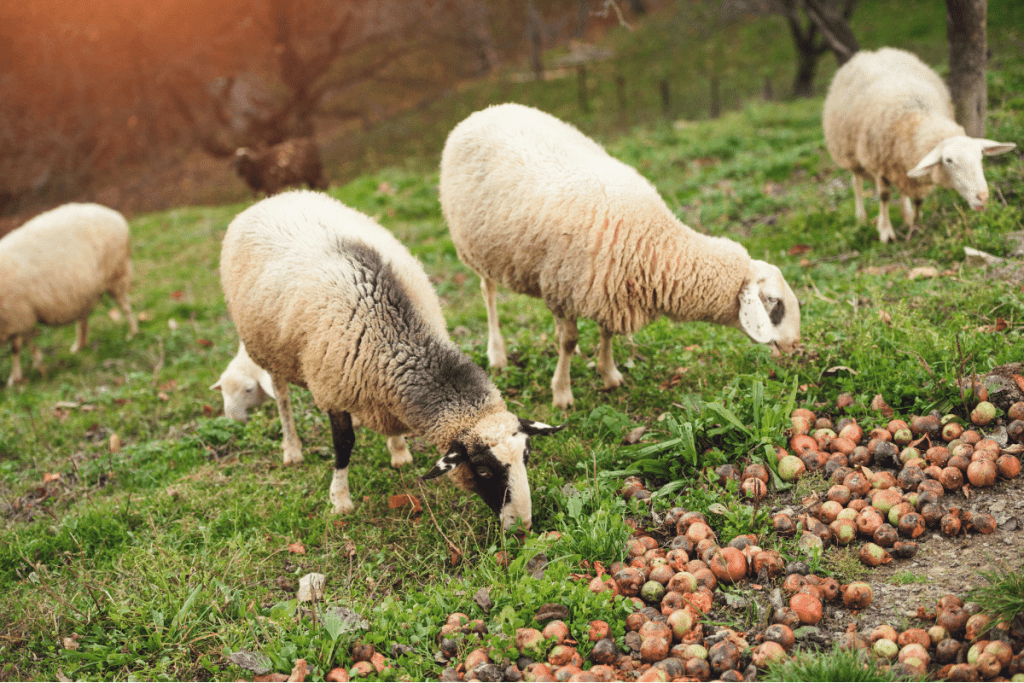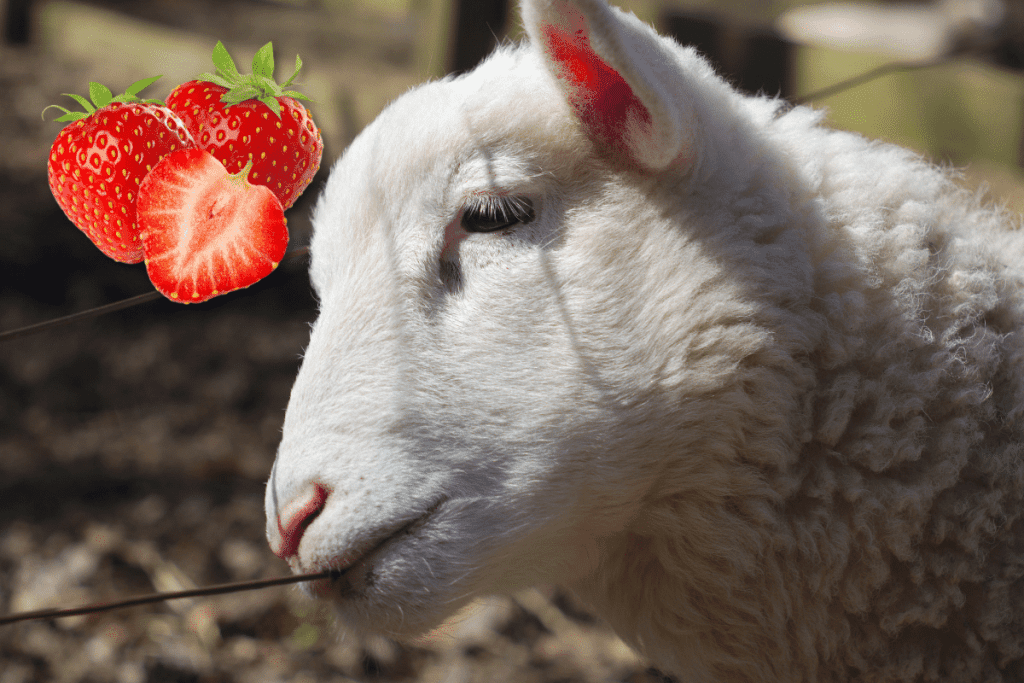Bond with your sheep and ensure they meet all their nutritional needs with treats.
Fruit can make some of the best treats for sheep out there!
However, you have to use fruit sheep can eat.
Sheep are ruminal eaters who love to eat fruit like bananas, watermelon, grapes, tomatoes, apples, and even cucumbers from time to time. Some fruits, such as apples, are safe with the proper preparation. On the contrary, fruits with pits are dangerous to sheep, especially avocados and cherries, which are toxic to them.
If you want to know more about what fruits your pet sheep will love, keep reading!
We’ll look at some of the tastiest sheep treats you might also see in the produce section to offer fresh snacks among sheep feeds and mineral blocks.

Table of Contents
ToggleBananas
Bananas are a popular choice of snack for farm animals and pet sheep.
These fruits are an excellent source of vitamins, antioxidants, fiber, and the potassium they’re so well-known for.
Can sheep bodies handle them, though?
Yes, they can!
In fact, sheep will eat the entire banana and leave nothing behind.
The peel and stem you might toss in the compost are perfectly digestible by their bodies, making them a tasty snack and a sheep supplement for all the nutritional benefits bananas offer.
Apples
Apples can serve as an excellent snack and lend to the mineral, vitamin, fiber, and potassium requirements of sheep.
However, don’t just use whole apples as food for sheep.
The seeds are poisonous to these animals in high amounts, so make sure to feed them slices without the seeds intact.
On the other hand, while sheep love apples, they won’t naturally eat apples left to their own devices outside a farm setting.
This makes apples better as an occasional treat rather than a regular element of commercial feeds.
Grapes
Grapes offer a lot of benefits when used as sheep treats.
They are great sources of vitamin C and vitamin K. Plus, they have antioxidants to help keep your sheep healthy and can reduce inflammation.
For sheep owners, another benefit of feeding grapes to sheep is these are easy snacks too.
You don’t have to prepare them like apples and grapes are so small they’re already fairly easy for these foraging animals to eat.
Strawberries

Strawberries are tasty fruits to sheep, but you’ll want to keep moderation in mind if you want healthy sheep in your flock.
While strawberries are a safe snack for sheep, these plants are high in sugar as well as nutrients.
As such, too many strawberries aren’t great for them, and strawberries aren’t a great choice as a regular part of the feed for sheep.
Watermelon
Watermelon is another great choice for sheep.
Many farmers and pet sheep owners even share their watermelon leftovers with their sheep.
Not only are watermelons full of essential nutrients, but they’re an excellent source of hydration as well.
After all, these plants retain a lot of water in the fruit, making this a refreshing treat on a hot day during the dry season to help your sheep meet their daily water requirements.
Tomatoes
Tomatoes are another fruit sheep can have, but under certain limitations.
Specifically, feeding your sheep red, ripe tomatoes is okay, but your farm animals and pet sheep shouldn’t forage on tomatoes as pasture plants.
The leaves of tomato plants pose a risk to your sheep.
These leaves contain an alkaloid your sheep’s bodies won’t handle well.
Intaking the entirety of these leafy plants or excess feeding can lead to symptoms such as problems with eyesight, confusion, and increased body temperature.
This alkaloid is present in the green parts of tomatoes as well.
This means you must stay away from unripe tomatoes of any degree when choosing treats for your pet sheep.
According to this The Ohio State University study, the alkaloid in question fades from the tomato as the skin ripens to red.
At this point, it’s safer to share the fruit with livestock animals.
All in all, tomatoes can serve as delicious treats for sheep but aren’t rich in valuable nutrients.
Sheep should not be left to graze on the plants in their entirety.
A few bites of a juicy, red tomato still make for a great occasional treat, even if they don’t work as daily feed.
Further Reading: Safe vegetables for sheep
Can Sheep Have Cucumbers?
Cucumbers are another beneficial snack to help meet the nutritional requirements of your sheep.
Again, they can’t replace daily feed, but they make a great snack.
Cucumbers boast benefits such as being rich in antioxidants, full of vitamin C and feature beta-carotene, lignans, manganese, and flavonoids.
In simple terms, it’s a snack your sheep are likely to find tasty, and it can help boost the health of sheep in your flock as such a choice full of basic nutrients.
I hear you now: Why are cucumbers on a list of fruit for sheep?
Well, technically, botanically, cucumbers are a fruit.
Now you know!
Foods To Avoid For Sheep
While there are numerous fruits to use as sheep treats, there are some plants to avoid feeding your sheep at all costs.
These include:
- Avocados
- Cherries
- Stone fruit
- Potatoes
- Celery
- Parsley
- Animal products
As far as fruit goes, avocadoes are dangerous for more than just their pit.
Any part of the avocado plant is dangerous to sheep because of the presence of persin in avocados.
While it may not affect your favorite dishes, it’s toxic and can negatively affect your sheep.
Sheep with stone fruit, cherries, and other pitted fruit are also at risk of eating the pit.
This can result in the pit getting caught in their stomach, which is dangerous even to otherwise healthy sheep.
How useful was this post?
Click on a star to rate it!
We are sorry that this post was not useful for you!
Let us improve this post!
Tell us how we can improve this post?
